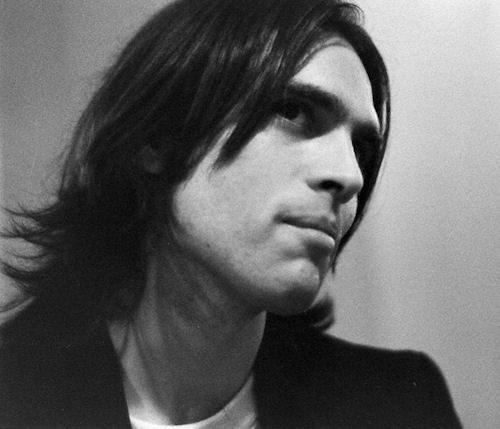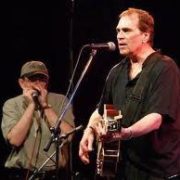ERIC ANDERSEN AT MCCABE’S
Eric Andersen at McCabe’s
A Bard by Any Other Name – April 23, 1616—April 23, 2016
 “All the world’s a stage,” said William Shakespeare, but there’s only one McCabe’s. April 23, 1616, four hundred years ago tonight, Shakespeare, the greatest poet in the English language, passed away. But Eric Andersen is still here, so the English language is in good hands. He performed at McCabe’s this evening, a quarto of the best songs written over the past fifty years—including Thirsty Boots, Violets of Dawn, Amsterdam and Close the Door Lightly When You Go. It was a pleasure and an inspiration to observe the anniversary of Shakespeare’s death in the company of an artist who avoids the name “singer-songwriter” in preference to a higher calling: song poet, which describes Eric Andersen to a “T.” For tonight, though, let’s just call him the bard.
“All the world’s a stage,” said William Shakespeare, but there’s only one McCabe’s. April 23, 1616, four hundred years ago tonight, Shakespeare, the greatest poet in the English language, passed away. But Eric Andersen is still here, so the English language is in good hands. He performed at McCabe’s this evening, a quarto of the best songs written over the past fifty years—including Thirsty Boots, Violets of Dawn, Amsterdam and Close the Door Lightly When You Go. It was a pleasure and an inspiration to observe the anniversary of Shakespeare’s death in the company of an artist who avoids the name “singer-songwriter” in preference to a higher calling: song poet, which describes Eric Andersen to a “T.” For tonight, though, let’s just call him the bard.
“There are more things in Heaven and Earth than are dreamt of in your philosophy,” as Hamlet reported to Horatio, but Eric Andersen has long been drawn to philosophers as well as poets—and tonight is no exception. As his great modern freedom song says, he’s long been on the open road, and shows no signs of slowing down. He tells us he was recently in New York for a couple of weeks doing shows in a special series devoted to commemorating the 70th anniversary of existentialist philosopher Albert Camus’ visit to America in 1946 (full disclosure: the year your correspondent was born). Eric Andersen wrote four songs for the Camus Centennial in 2013, based on four classic Camus books: The Rebel, the Stranger, The Plague and The Fall. They are now available on his four-song LP called Shadow and Light of Albert Camus—which he performed in New York for the recent series, in conjunction with other literary participants.
“Nothing will come of nothing,” Lear told his daughter Cordelia, and alas, I am sorry to say none of them made it into the McCabe’s show, but he did not leave us litterateurs unfed and hungry for the classics. He turned back to one of the great Romantics—from my favorite Dorothy Parker poem:
Byron, Shelley and Keats
Were a trio of lyrical treats
Keats never was descended from Earls
And Shelley walked out with a head full of curls
And Byron was always one for the girls
But that didn’t diminish the lyrical feats
Of Byron and Shelley
Byron and Shelley
Byron and Shelley and Keats.
“To thine own self be true,” Polonius counseled his son Laertes, “and thou canst not then be false to any man,” in keeping with which Andersen has long followed his own muse in bringing English and Continental literature into his songwriting, and tonight we were thrilled to have him end the concert with an encore of a new song based on the works of Lord Byron—Mingle With the Universe—with an extended introduction about Byron’s singular personality which made him—in Andersen’s words—“the first rock star in English poetry.” He was indeed the Prince of his time—so controversial for both his sexual conquests (with men and women) and political exploits that it wasn’t until 1968 that he was officially forgiven and honored in the Poet’s Corner of Westminster Abbey—more than two hundred years after dying from an illness he sustained by swimming the Hellespont in Greece at the age of 36—where he had gone to support their revolution. They don’t make poets like Byron today—or Eric Andersen either.
Andersen clearly rejoiced in being able to share his life story as well as the poem he had set to music. It was a beautiful note to end on—four hundred years to the day after the passing of the greatest poet in the English language—W.S., whose epitaph reads:
Good frend for Iesvs sake forbeare,
To digg the dvst encloased heare.
Bleste be ye man yt spares thes stones,
And cvrst be he yt moves my bones
Which modernized reads:
Good friend, for Jesus sake forebear
to dig the dust enclosed here
Blest be ye who spares these stones
And cursed be he who moves my bones.
In one of Andersen’s earlier songs he laments,
I never got to play Hamlet
But I learned some good lines,
so I gather that Andersen is one of those “good friends” of the original bard. “Love is not love which alters when it alteration finds,” is from a sonnet Andersen echoes. His gentle love songs remain the purest expression of modern folk music—Violets of Dawn and Close the Door Lightly When You Go—recorded by the late great Ricky Nelson, and his modern classic freedom song, Thirsty Boots, recorded by Bob Dylan. They are all played in “G” tuning with a capo on the third fret, in a lovely finger-style accompaniment—as beautiful testaments to the art and the heart of song as I know. I never get tired of hearing them performed by the master song poet who created them.
Tonight, moreover, they were especially beautiful, as Andersen was accompanied by the great violinist Scarlet Rivera, who Bob Dylan discovered on the streets of Greenwich Village in the mid-eighties and brought into the recording sessions for Desire. She has gone on to record for Tracy Chapman and other artists—and she raised the level of Eric Andersen’s concert with a magic touch in both pizzicato and bowed harmonies that made you appreciate how fully realized his melodies are along with the poetry of the lyrics. Her musicianship never overwhelms a song, but brings out its innate beauty. “If music be the food of love, play on,” I thought; for Andersen has a love of music as well as poetry that makes wonderful connections with other artists—such as the Band’s late Rick Danko (with whom he co-wrote a song from tonight’s set, You Can’t Relive the Past, and whom he remembered for his whimsical one-liner, “Rehearsing is a negative attitude”) and Van Dyke Parks—who accompanied him the last time he was at McCabe’s.
“To be honest as this world goes,” said Hamlet to Horatio, “Is to be one man picked out of ten thousand;” one might say the same about guitarists. For this generous two hour and twenty minute concert Anderson was also accompanied by an honest guitarist— on acoustic, electric and slide guitar for a Junior Wells blues—Steve Postell—and on the encore by Steve’s sister Susan Postell—who Andersen brought back on stage to end the show with a standing ovation and royal curtain call hand-in-hand with all accompanists in a choral rendition of his setting for Byron’s poem Mingle With the Universe—one of the highest musical moments I have ever experienced at McCabe’s.
Finally, Andersen is a delightful raconteur who takes you on a comedic journey with tales that are quite mad—for “genius is to madness near allied”—as well as through his music. He made a special throat spray he dubbed “Singer”—specifically formulated for “Singer’s Throat”—a comic stage prop of the first order—telling you how he found it—first at a party in Italy where it was given to him by no less than Luciano Pavarotti—and later at a party in Madrid where he was turned onto it by no less than Placido Domingo. Rarely has a throat spray come so highly recommended. Every time he hit a rough note he pulled out his “Singer” to bring his voice back into form. Perhaps like Hamlet he was “but mad North by Northwest,” for it was perfectly timed and utterly charming. Try to imagine Dylan pausing mid-performance to spray his throat and you’ll see what I mean.
Maybe I can make you laugh
And maybe I can try
Just looking for the evening
And the morning in your eye
he sings in Thirsty Boots chorus, and he certainly did tonight. Eric Andersen is a consummate entertainer and song poet both—and an evening with him is a rare opportunity not to be missed.
My friend and FolkWorks colleague Terry Roland was also at the concert and was pleased to hear Eric sit down at the piano late in the show and perform his modern spiritual Blue River—which Terry wrote about—and which prompted Andersen to say, “It will get you ready for church tomorrow, although I thought this was church.” Amen.
“There is something rotten in Denmark,” both Hamlet and Andersen have observed. His great modern anti-neo-Nazi song—Amsterdam—with powerful lines like “Keep your filthy Swastika; keep your iron cross” are in the vein of World War II French resistance existentialist philosophers like Camus and Sartre, and evoked a loud “Bravo!” from the back of the room as the last notes died away.
He knows whereof he sings, for Andersen lives in Denmark now, and this great anti-fascist protest song he wrote in their honor—Amsterdam—which pays tribute to the yellow stars (which he perfectly rhymes with the other symbol “cattle cars”) Danes gallantly wore during the Holocaust to demonstrate their allegiance to Jews who were forced to wear them is the rarest example in modern song literature of an artist who has put his guitar all the way out where Woody Guthrie wore it—who displayed the proud sign “This Machine Kills Fascists.” As one of a group of Broadside Magazine songwriters editor Agnes “Sis” Cunningham introduced as “Woody’s Children,” she would have been happy to hear Eric’s early Woody-inspired song Dusty Boxcar Wall, which first appeared in her magazine.” I certainly was.
Eric Andersen still walks in Woody’s shoes—or should I say “Thirsty Boots.” Bravo!
Los Angeles folk singer and Local 47member Ross Altman has a PhD in Modern Literature from SUNY-Binghamton. Ross may be reached at greygoosemusic@aol.com













